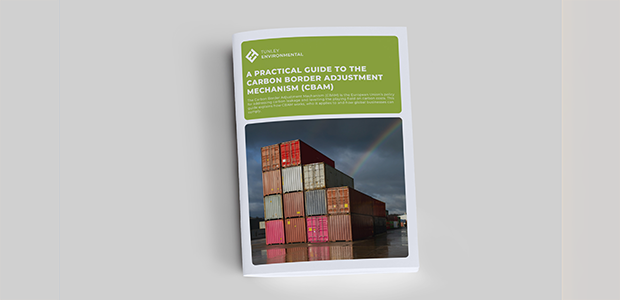
Navigate EU Carbon Border Rules with this new CBAM guide
Companies trading with the European Union can now access Tunley Environmental’s new CBAM Guide, developed to help organisations understand and respond to the Carbon Border Adjustment Mechanism (CBAM) regulation.
The guide simplifies the reporting process and equips businesses with the tools needed to navigate one of the EU’s most impactful climate policies.
As CBAM exits its transitional phase, organisations trading with the EU must now report embedded emissions in key imported goods. Tunley Environmental’s new guide is tailored to help businesses understand their obligations, streamline their reporting processes and future-proof their operations under CBAM regulation.
It builds on Tunley’s proven track record of helping clients meet their CBAM obligations, offering clear, expert-driven advice to support businesses through the regulation’s transitional phase and beyond. This guide outlines what CBAM means in practical terms and how businesses can meet their quarterly reporting requirements with confidence.
Developed for sustainability leaders, compliance professionals and import managers, the CBAM Guide provides:
- An essential overview of what’s required under the legislation (including emissions reporting, data collection processes, and sector-specific considerations for the various materials required to be reported under CBAM)
- A step-by-step guide on how to prepare for CBAM compliance.
- A detailed checklist to determine if your company will need to comply with CBAM.
Dr Nathan Wood, Senior Scientist & Carbon Co-lead at Tunley Environmental, said: “CBAM represents a major shift in how carbon is priced and tracked at the border. Our guide is designed to cut through the complexities and support businesses with early action, accurate reporting and strategic carbon management. Acting now will help businesses stay competitive, reduce risk, and support their Net Zero journey.”
With public and private sector clients under increasing scrutiny to reduce Scope 3 emissions and report on supply chain impacts, the guide also helps organisations prepare for upcoming changes in green claims legislation, procurement policy and climate reporting standards. Organisations looking to improve supply chain resilience, secure more sustainable tenders and lead with purpose are encouraged to make full use of this valuable resource.
For more startup news, check out the other articles on the website, and subscribe to the magazine for free. Listen to The Cereal Entrepreneur podcast for more interviews with entrepreneurs and big-hitters in the startup ecosystem.

